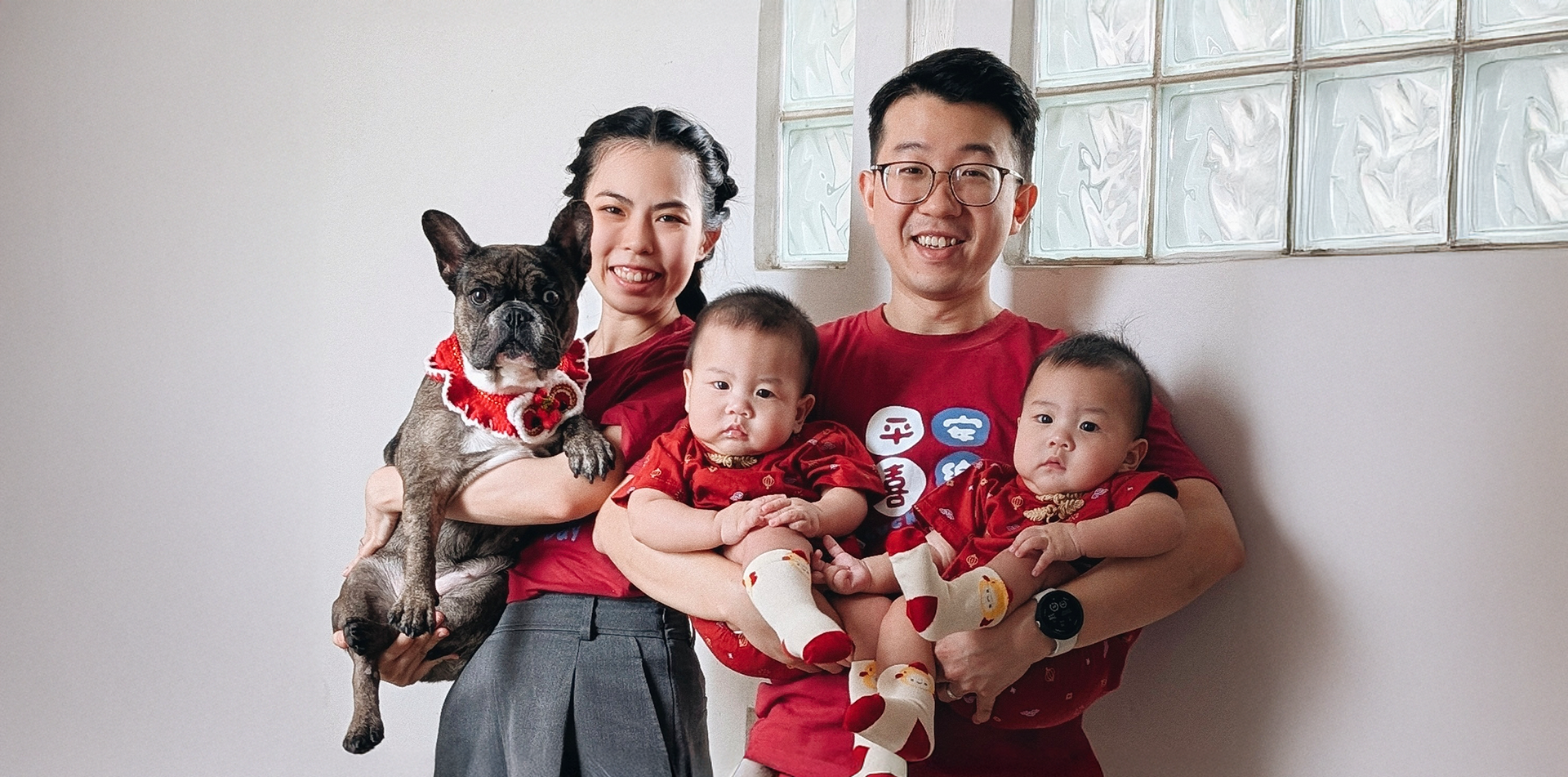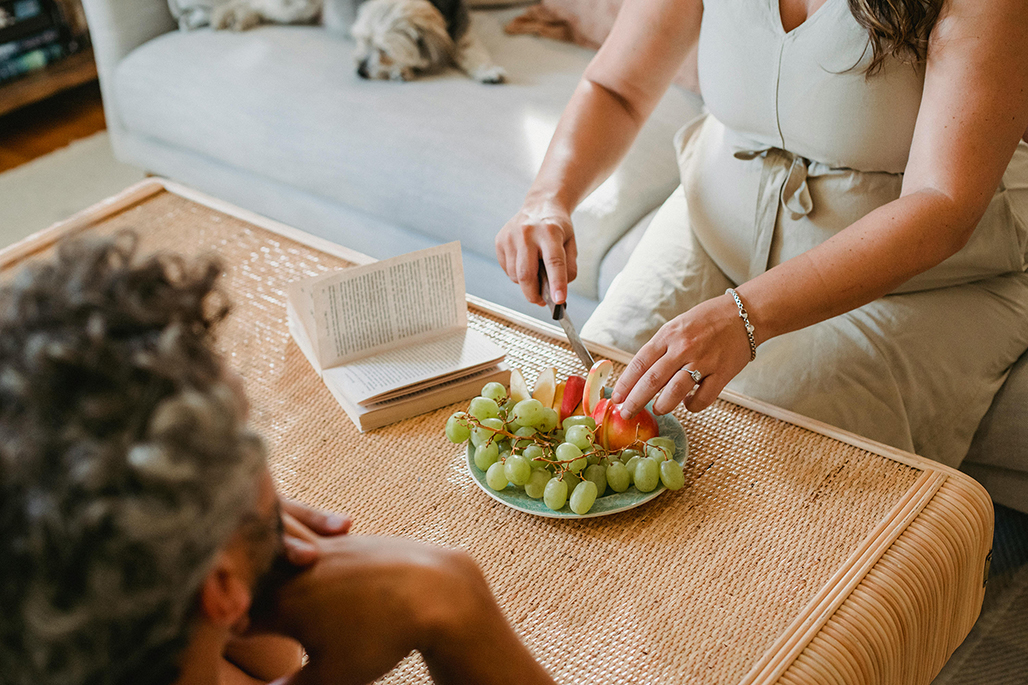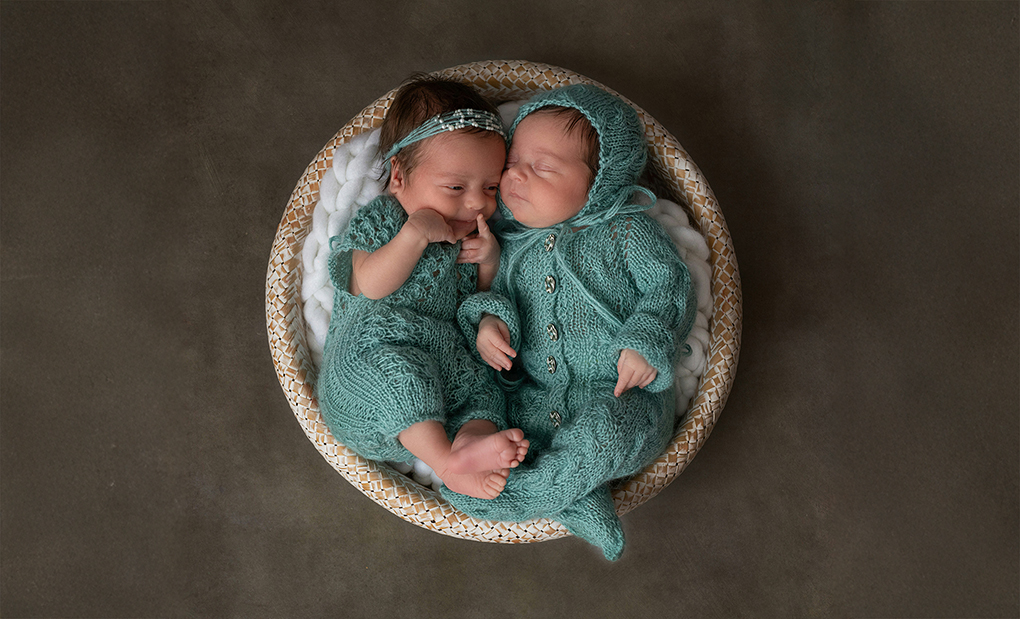Bringing home one newborn is a life-changing event, but what is it really like to welcome two at once?
For parents of multiples, the journey from pregnancy to postpartum is filled with unique challenges, joys, and surprises. Sarah Goh (30, Marketing Manager) and Harold Koh (32, Strategic Communications Manager) recently navigated this exact adventure with their twin boys, August and Anders, who are now 15 months old—all while also caring for their 4-year-old Frenchie, Bambii.
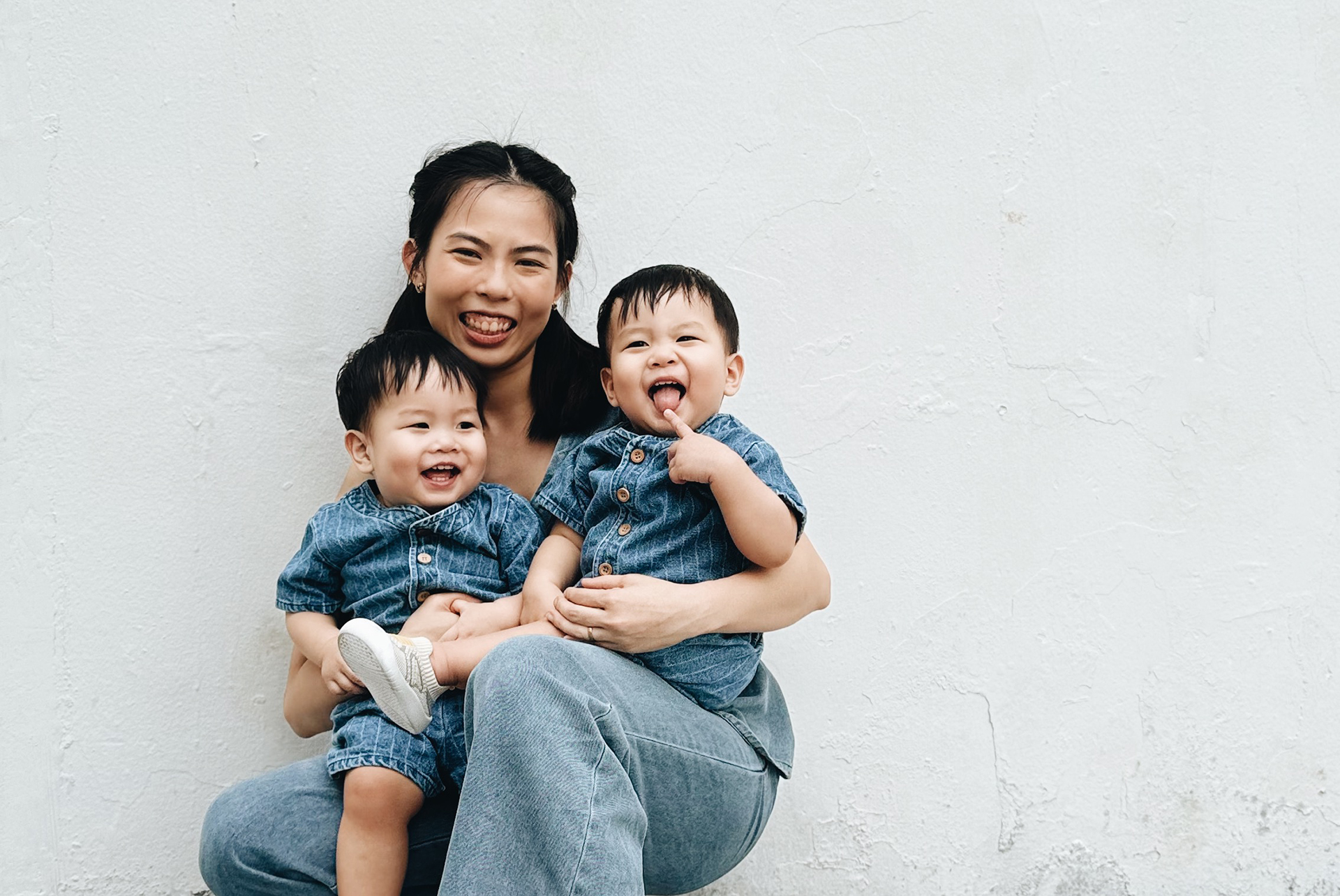
From the shock of their twin pregnancy announcement to choosing a subsidised route at KK Women's and Children's Hospital (KKH) and overcoming a dramatic delivery, they share their candid story, practical advice, and the real costs of having twins in Singapore.
–––
Welcome, Sarah and Harold! Can you please introduce yourselves?
We began dating in 2015 and got married in 2023. At the end of that year, we received the wonderful news that we were expecting twins. It's been quite the adventure learning to navigate this new world of parenting two little ones simultaneously—full of unexpected moments, plenty of learning curves, and more joy than we could have imagined.
How was it like when you first found out you were expecting twins?
S: Harold's immediate reaction was pure shock; the only word that came out of his mouth was, "Huh?" As for me, the surprise was so overwhelming that I literally lost my breath. The sonographer had to gently ask me to hold still so the scan could be completed because I was hyperventilating! It was one of those life-changing moments where disbelief and excitement collide, and we knew our journey ahead would be beautifully unpredictable.
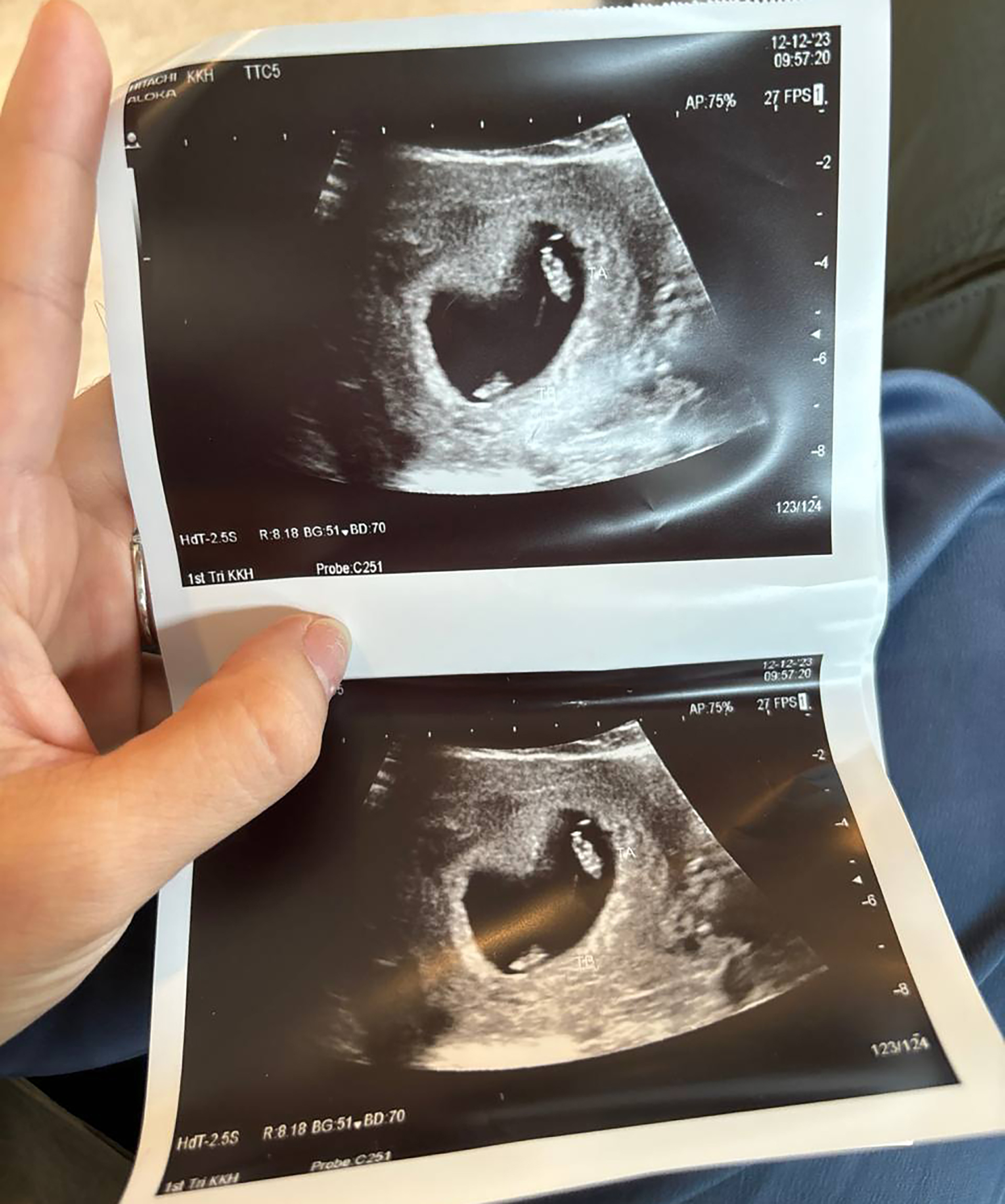
We chose KKH and went with the subsidised route, so we did not have an assigned doctor. Part of it was for financial reasons, but also because we trusted the system. Since twins are considered high-risk pregnancies, we knew we would end up at KKH anyway if any complications came up.
H: Another factor is that Sarah and I are the sort to go with the flow. As KKH is known for their expertise in treating women and children in Singapore, it gave us peace of mind to stay with them from the start.
On top of that, we were not expecting a twin birth, so being financially conservative felt like the right call.
Can you tell us about your pregnancy?
For most of the pregnancy, we felt incredibly fortunate that things went smoothly. Sarah experienced the usual tiredness and found herself craving lighter, sour foods, which became quite the adventure in meal planning! She enjoyed Tom Yum and drinks like lemon lime tea—mostly soupy, light, and sour things.
Since our boys are Monochorionic Diamniotic (MCDA) twins (sharing one placenta but in separate sacs), Sarah was prescribed iron supplements and we had more frequent check-ups, which helped us feel more at peace.
We kept the twin surprise under wraps until our gender reveal; that's when we finally shared that we were expecting two boys. Seeing everyone's faces and reactions really helped us realize what an extraordinary journey we were embarking on together.
Around Week 31, the doctors noticed the twins weren't sharing blood flow as evenly as hoped. While it was frightening to face the possibility of an early delivery and Neonatal Intensive Care (NICU) stay, we found unexpected comfort in knowing how closely we were being monitored.
There was a point at the hospital where you were unexpectedly given a choice about how to deliver. Sarah, can you describe that moment and what it felt like to have agency returned to you after a complicated pregnancy?
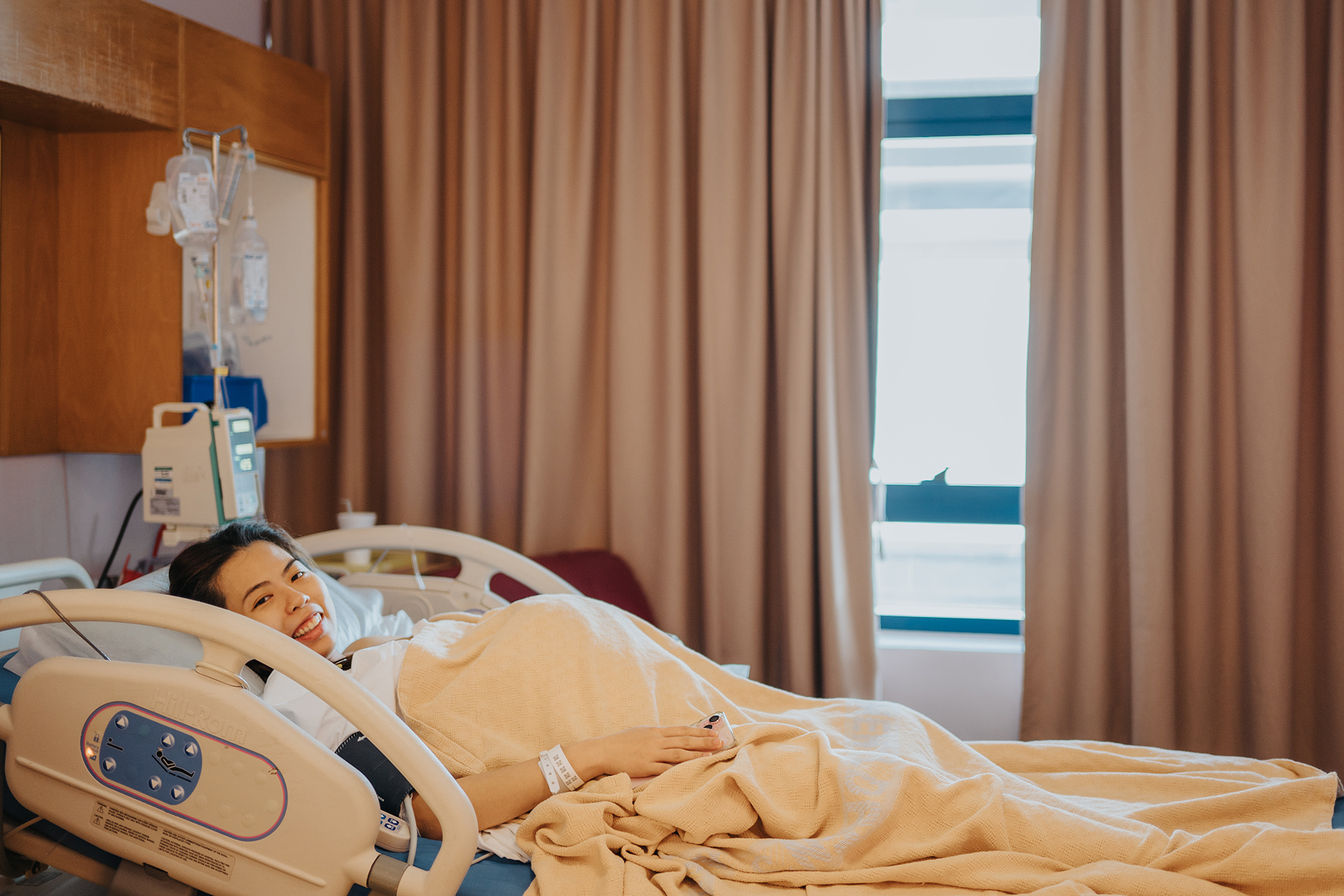
It felt almost dreamlike. I had mentally prepared myself for a C-section, believing it was the safest path forward. When the doctors suddenly offered me the option of a natural delivery, I'll admit I panicked; I hadn't prepared myself mentally for that process! But underneath the initial fear was this profound sense of relief and gratitude. I realized that deep down, a natural delivery was what I truly hoped for. In that moment, I found courage I didn't know I had and decided to trust my body and the incredible medical team supporting us.
Harold, from your perspective as the support partner, what was the most intense part of the delivery process?
The delivery of our second twin, Anders, was definitely the most intense moment. He was positioned transverse, and suddenly there was this flurry of activity with the doctors trying different approaches and discovering his water hadn't broken yet. My job in that moment was simply to be Sarah's anchor by holding her hand, offering encouragement, and reminding her that we were in this together. Sometimes the most powerful thing you can do is just be present and steady when everything else feels chaotic.
Sarah, what was the biggest challenge you had to overcome during labor, and what gave you the strength to push through?
Those thirteen minutes delivering Anders were the longest of my life. The epidural hadn't fully taken effect initially, and exhaustion was setting in. But in those moments, I found myself thinking about the incredible women who came before me—my mother, my grandmothers, and my aunt who also has twins. They had walked this path and found their strength.
I kept focusing on one simple goal: bringing both boys earthside safely.
Sometimes breaking things down to that one essential purpose can carry you through anything.
The first moments after birth are so special. What was it like to finally meet August and Anders? Were you able to have immediate skin-to-skin contact, or did their early arrival require special care?
Honestly, it wasn't quite the magical movie moment I had envisioned. The boys were briefly pressed against my cheek before being whisked off to special care, with Harold following close behind. I found myself alone in the delivery suite, crying not from disappointment, but from overwhelming relief that Anders had arrived safely and that we'd made it through together. The deep bonding and joy grew in the hours and days that followed as we all settled into this new reality as a family of four.
Sarah, after such an intense and unexpected birth, how was your physical recovery? What was the hardest part of those first few weeks postpartum, and what little thing brought you the most comfort?
Recovery was humbling, to say the least. My back and sitting bones were tender for weeks, and I'm so grateful for the postnatal massages that provided relief. Having a background in dance helped me gently reconnect with my body and find movements that supported healing.
Emotionally, I sometimes felt overwhelmed, especially with so much family support around. Occasionally, I questioned whether I was doing enough as their mother, which I think many new parents can relate to. The moments that meant the most were when someone would simply remind me that I was capable and already doing my best. Sometimes we all need that gentle reassurance.
Can you please share with us your total delivery expenses, if you don’t mind?
Sarah: Our total cost from the pregnancy test kits all the way to delivery came to $6,293.92. As you already know, we opted for the subsidized route in KKH. As a twin pregnancy is considered high risk, we knew that we would likely end up at KKH either way even if we had gone with a private gynaecologist.
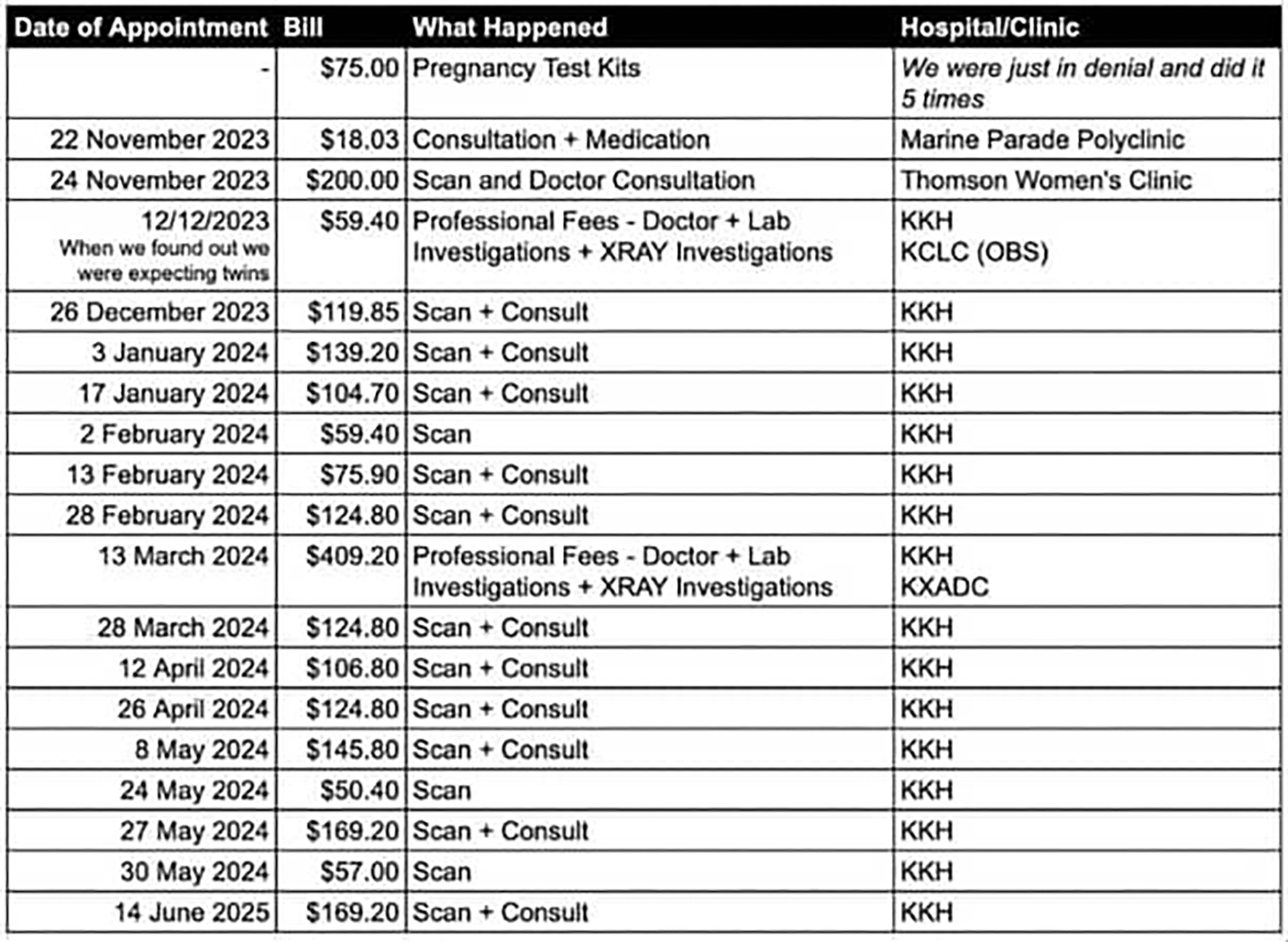
Total amount Sarah and Harold spent on doctor's appointments: $2,333.48
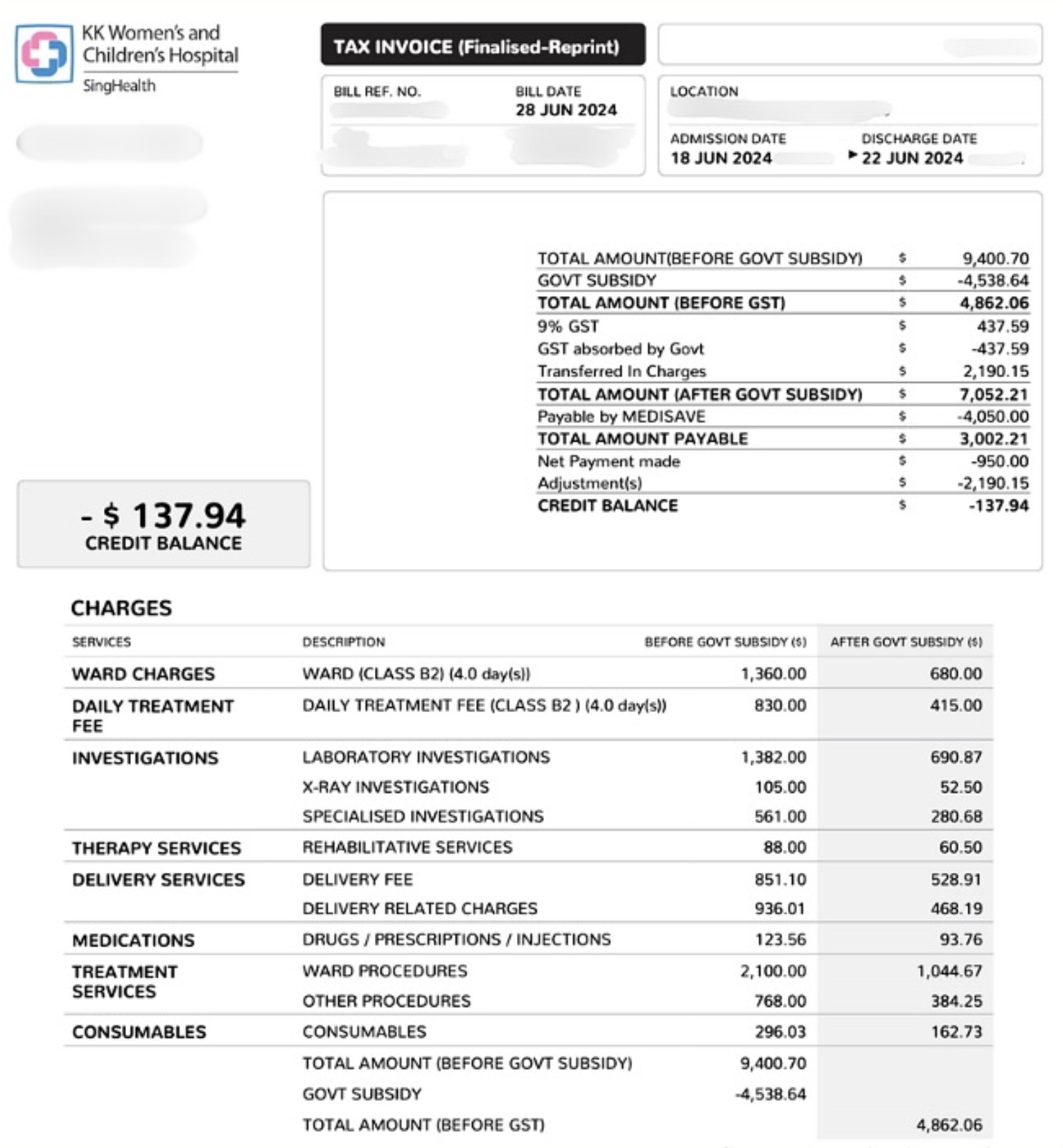
Total amount before government subsidy: $9,400
Total amount after subsidies and Medisave: $812.06
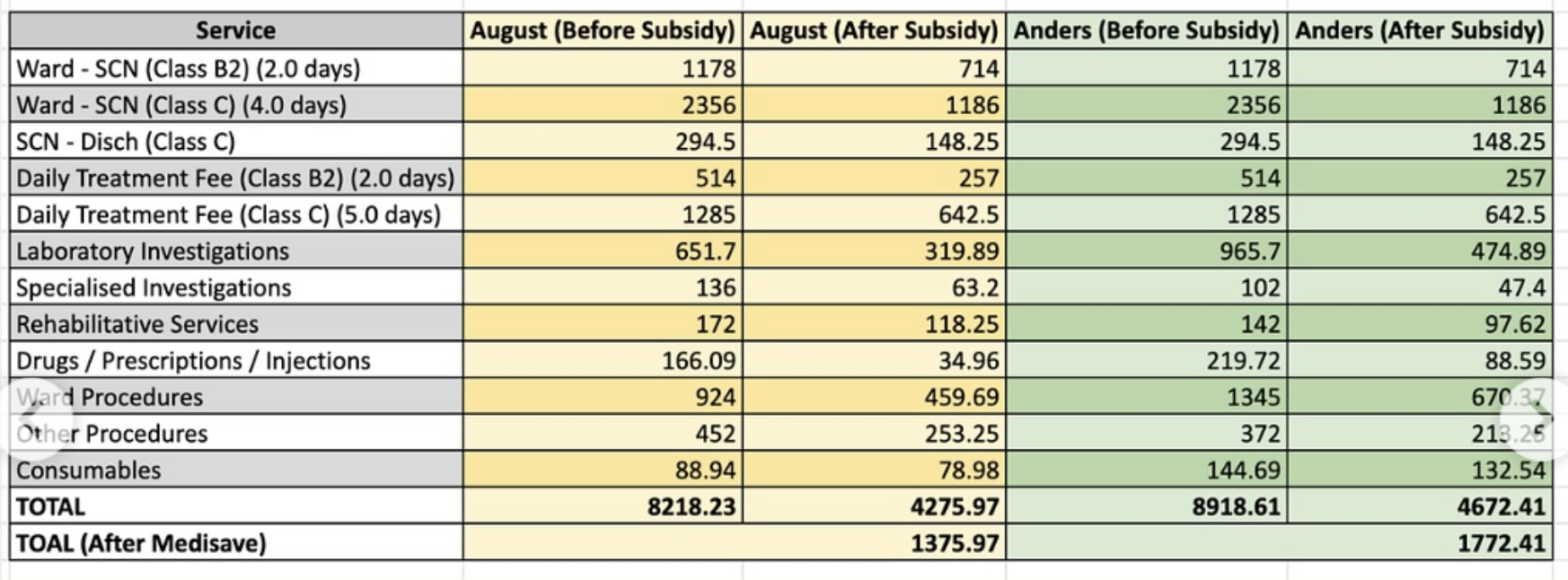
As for the twin boys, their total bill was $3,148.38. Anders required additional phototherapy during his 6-day stay in the Special Care Nursery (SCN). We’re very thankful they did not require admission to the NICU. The SCN nurses cared for them so well that I was able to get proper rest. I chose a B2 ward as it was affordable and practical. I also appreciated being able to seek help from the nurses nearby whenever needed.
The concept of confinement is common in Singapore. Sarah, did you practice a traditional confinement period, and if so, what did that look like for you?
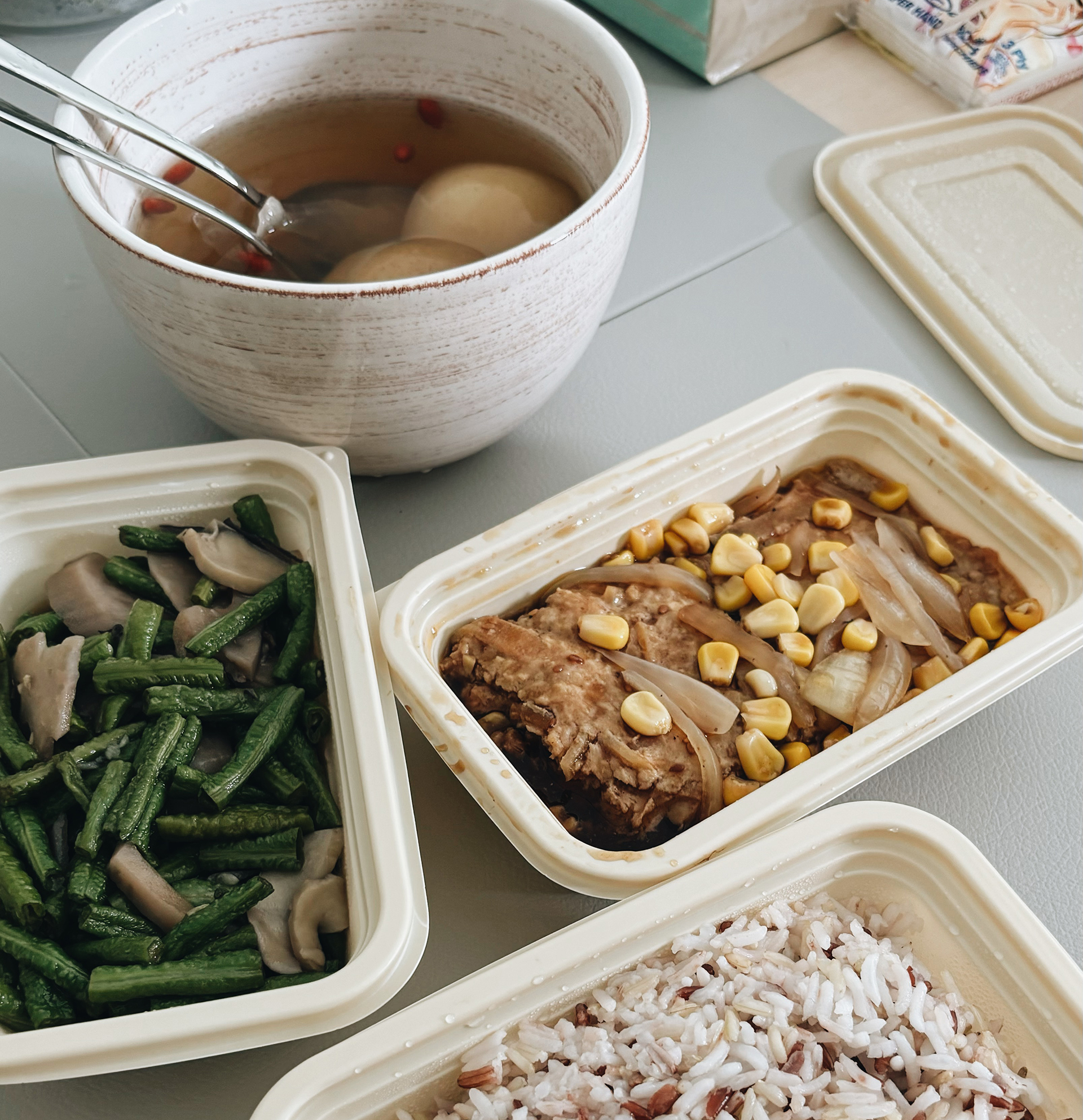
After exploring different options, we decided to have confinement meals delivered while relying on our wonderful family for support. Since we didn't have a helper yet, my mother stayed with us the first week, and then my mother-in-law and aunt took turns helping during the day while Harold and I handled nights together.

There was definitely a learning curve as everyone had different approaches to things like swaddling, bath temperatures, and sleep routines. We had to find our balance between being open to advice and trusting our instincts as parents.
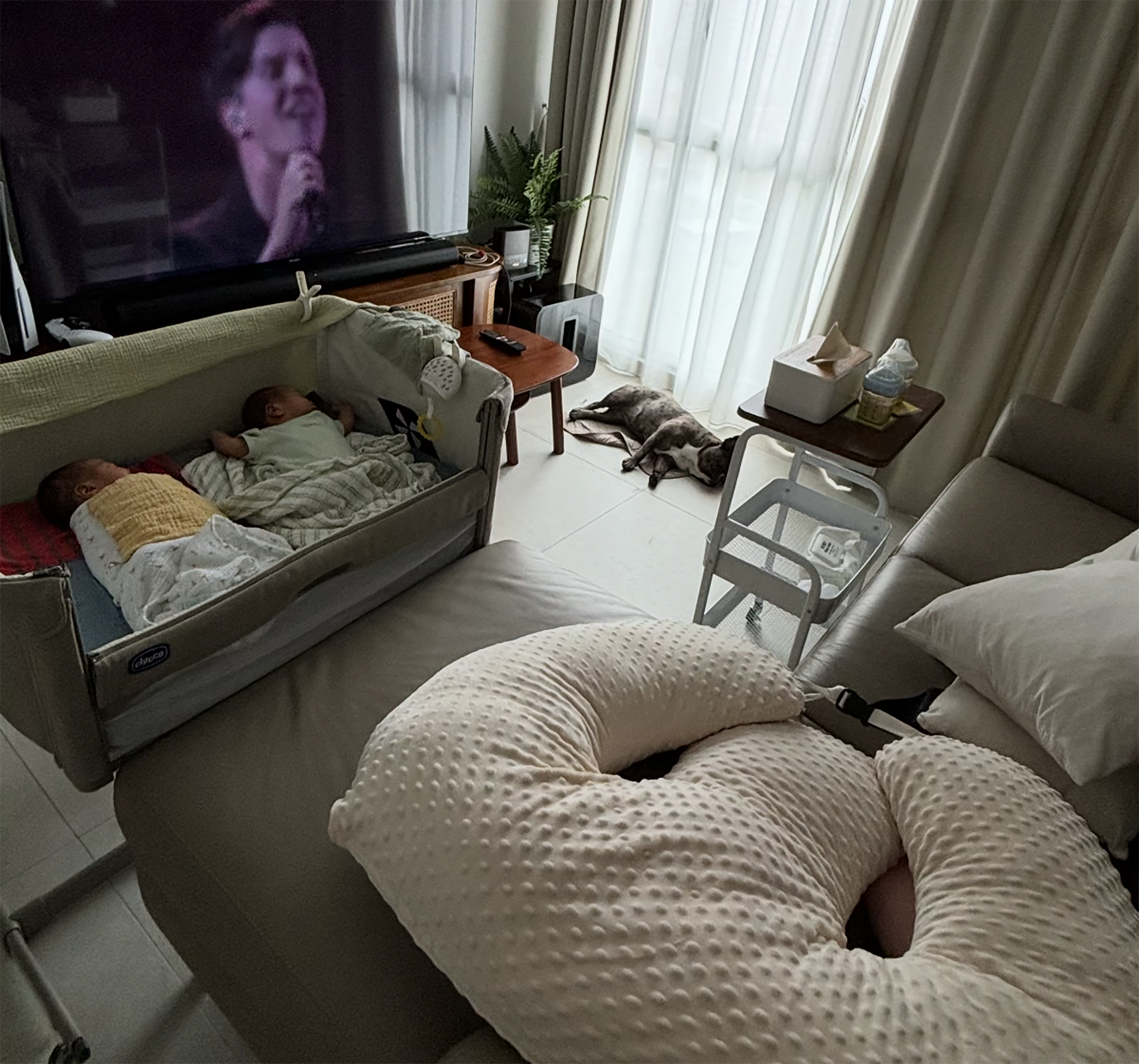
Looking back, we might have considered bringing a helper on board earlier; we waited until the boys were six months old, and when we did, it was truly life-changing in giving us space to breathe and be more present.
Harold, the partner's role is so crucial, especially with twins and a recovering mother. How did you support Sarah during her recovery while also bonding with your newborn twins?
H: I focused on taking care of household tasks and stepping in whenever Sarah needed a break. With two babies, we often found it worked well for each of us to focus on one child at a time; it gave Sarah some relief while allowing me to develop my own special bond with each boy.
My biggest personal adjustment was learning to let go of my need for control. Before becoming a father, I was quite particular about how things should be done. But twins teach you quickly that flexibility isn't just helpful; it's essential for survival and sanity!
Feeding twins is a huge undertaking. Can you share your feeding journey—whether breast, formula, or a combination? What challenges did you face, and what advice would you give other parents about feeding two newborns?
S: I initially hoped to tandem breastfeed, but exclusively pumping turned out to be the most sustainable approach for our family. I maintained that for six months before gradually transitioning to formula. My supply would fluctuate based on sleep, nutrition, and stress levels, and I'll admit there were moments when I found myself in tears over literally spilled milk!
When we introduced formula feeding, I felt this enormous weight lift from my shoulders. It gave me mental space to breathe, and surprisingly, my supply actually improved when I felt less pressure. Fed is best, truly. When you take care of yourself, you're in a much better position to care for your babies.
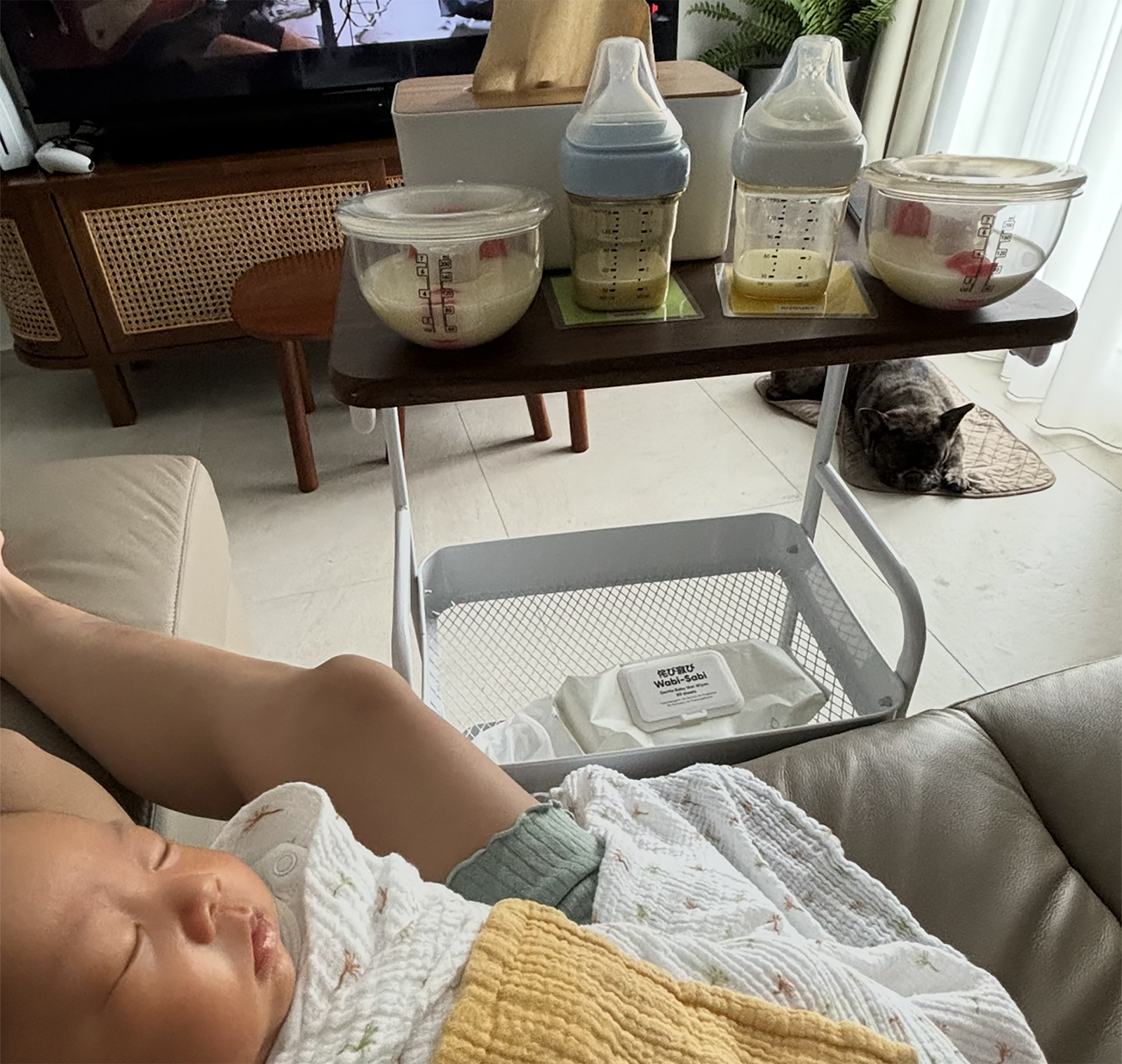
Also, keeping a simple notebook to track feeds was a lifesaver; it provided structure in the beautiful chaos and reassured us that we were staying on top of everyone's needs. I know there are apps available, but I found physically writing it down a lot faster when there was so much going on.
Sleep deprivation with one newborn is hard; with two, it's a whole other level. How did you two tackle sleep and nights as a team? Did you have a shift system, and how did you ensure you both got some rest?
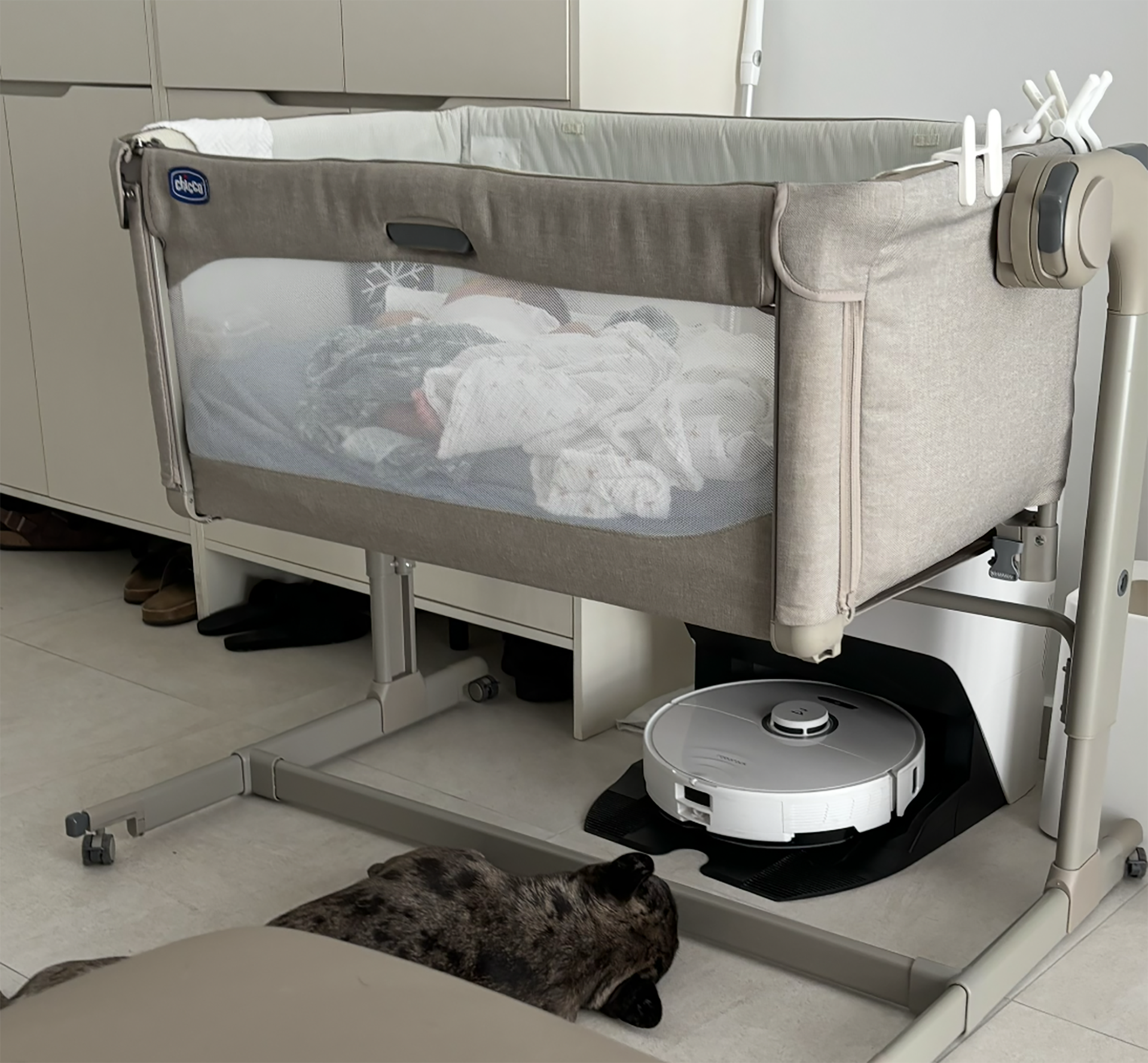
S: We worked hard to align the boys' schedules, which made nights more manageable. I typically handled the first wake-up, and Harold would jump in when needed. Weekend naps became sacred when the boys napped, and during weekdays we leaned heavily on our amazing family support during the day so we could catch up on rest. The sleep deprivation was real, probably unlike anything we'd experienced before, but having routines and working as a team made it feel much more doable.
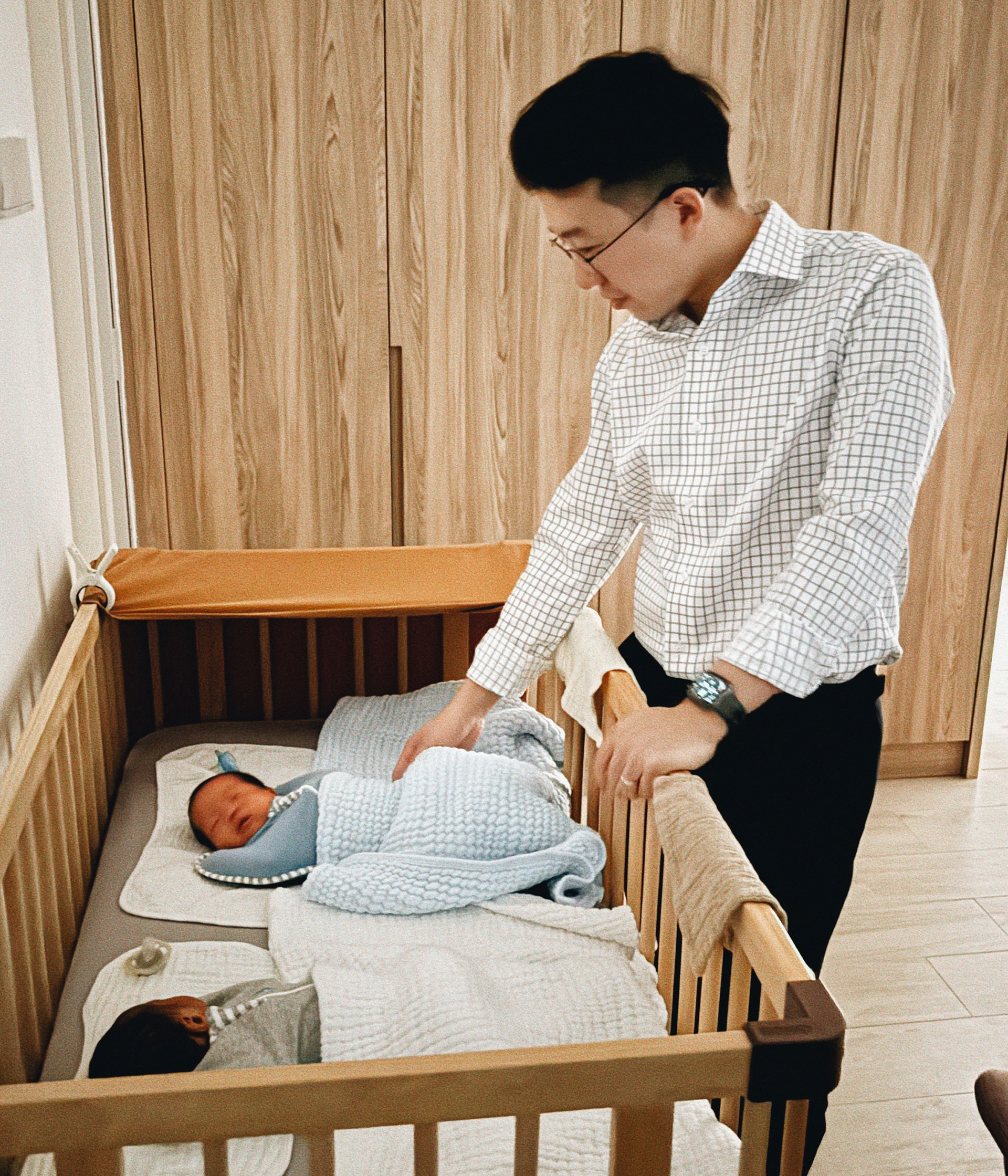
H: I ended my previous job just as I was about to start paternity leave, and I was really grateful that my employer allowed me to include it as part of the exit package. I took all four weeks in one go, which gave me time to adjust to life with the twins before starting a new role in a completely different industry. The new job was a regular 9 to 5, and honestly, it was tough in the beginning. What really helped was knowing Sarah had support at home during the day, so by the time I got back from work, I could wash up, have dinner, and take over.
We also had our parents step in on certain milestone evenings, like my birthday, to watch the boys. That gave Sarah and me a few precious hours to ourselves to just breathe and decompress. Right now, I am really just focused on the present and trying to keep a positive mindset.
Can you share a little more about how you assign duties to your helper? Does she only work on household related chores, or has she also been helpful with caregiving?
We set a clear structure for our helper from the start. Each day, she has specific areas of the house to deep clean on top of her daily chores. When she first arrived, I actually created an hourly schedule to help her settle in. Now that she is more familiar with how we live, we just check in on key things instead of micro-managing.
We are quite particular about food and groceries, so we still do the weekly shopping ourselves. We also plan out most meals, but to make things easier, we have equipped her with a set of recipes for days when we do not want to think too hard so she knows exactly what to prepare. If the kids are home on weekdays, whether from school closures or being unwell, she handles her daily chores first and then supports me with caregiving if needed.
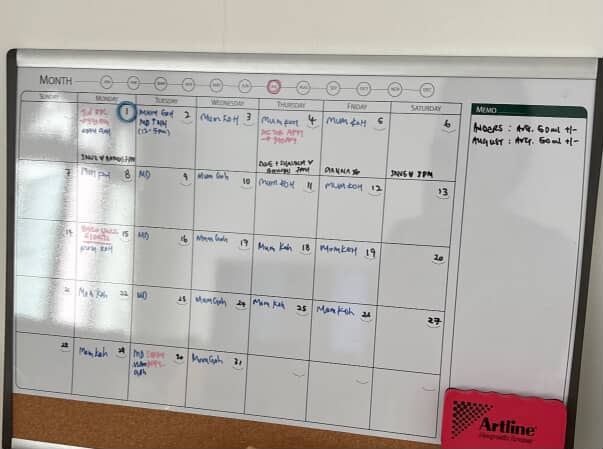
We also keep a whiteboard in the kitchen where I write down reminders and highlight key events for the month. That way, she is mentally prepared and knows what to expect.
For us, expectation management is really important. She is not just help but part of our family. I treat her a little like a younger sister or even a mentee at work, guiding, encouraging, and building mutual respect.
Above all, I think the key is alignment with your partner and always over-communicating with grace. That keeps things smooth for everyone.
Now that you're further along, what does a typical day look like for your family of four right now? What is your favorite part of this current stage with August and Anders?
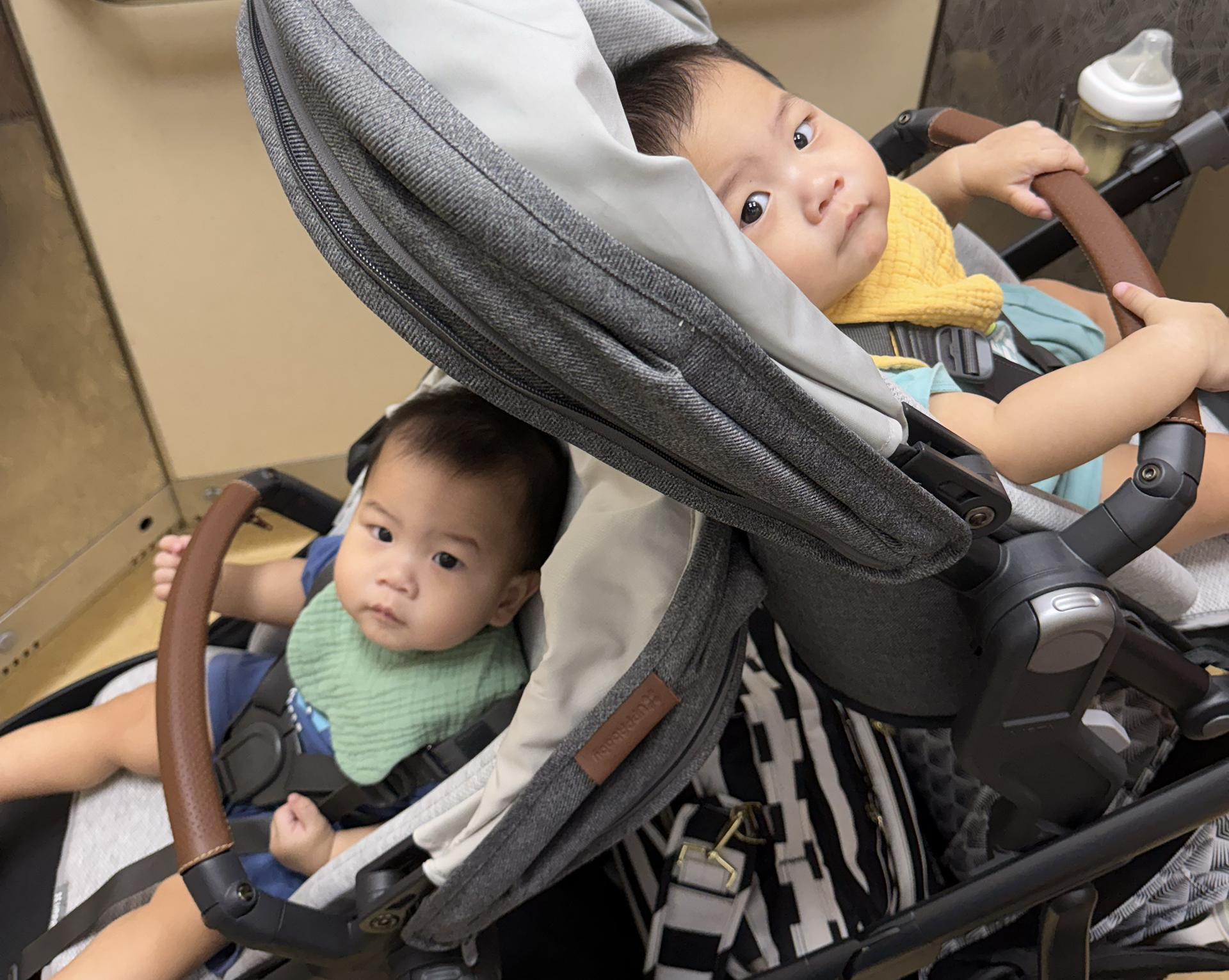
Our weekdays have found their rhythm: we drop the boys at school by nine, I'm able to finish work around four to pick them up by five, and evenings are spent with family dinner and their bedtime routine. By nine, both boys are usually peacefully asleep.
Weekends are slower and more flexible. We love those unhurried morning moments together before visiting their grandparents. Now that they enjoy the stroller, we sometimes let them nap on the go, which has opened up so many more possibilities for family adventures.
Looking back, what was one thing you worried about during pregnancy or postpartum that turned out to be completely fine? Conversely, what totally blindsided you that you wish you'd been more prepared for?
I was genuinely worried about how Harold would adjust to fatherhood, especially while starting a new job simultaneously. He surprised me by embracing both roles with such grace, even under all that pressure.
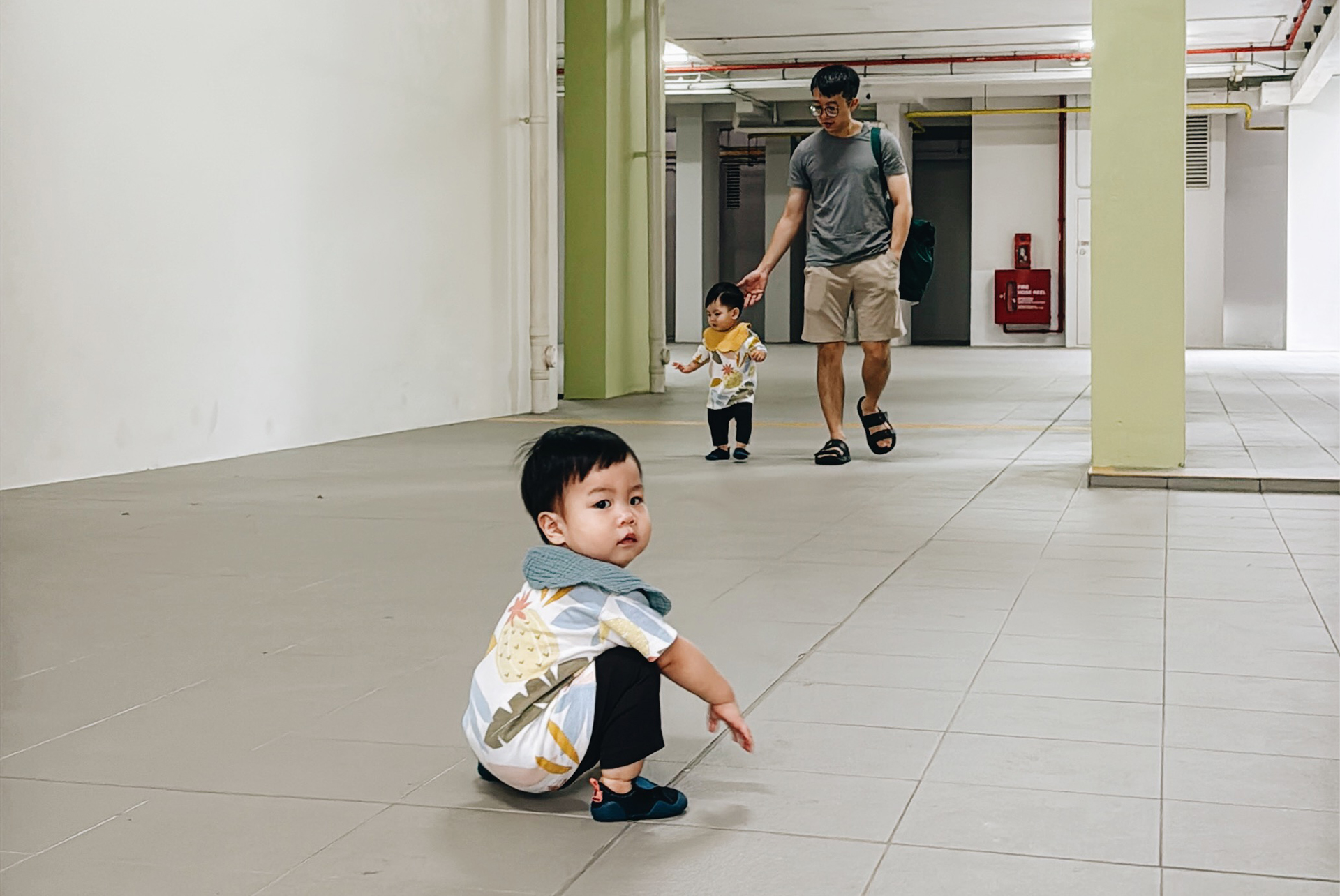
What caught us off guard was realizing how much help we truly needed with household tasks. With twins, a dog, and wanting to maintain a clean, healthy environment, we learned that accepting help isn't a luxury; it's necessary. When we finally welcomed a helper into our home, it freed up our energy to focus on the boys and be more present as parents.
What has been the most surprising thing about becoming parents to twins?
The most wonderful surprise has been discovering how much we've grown, both individually and as a couple. Having twins really does require you to build systems, work as a true team, and be thoughtful about every decision. We've also become much more mindful about our own health and wellness; we want to keep up with these energetic boys as they continue to grow!
Finally, if you could go back in time to the day you were discharged from the hospital, what one piece of advice would you give your new-parent selves?
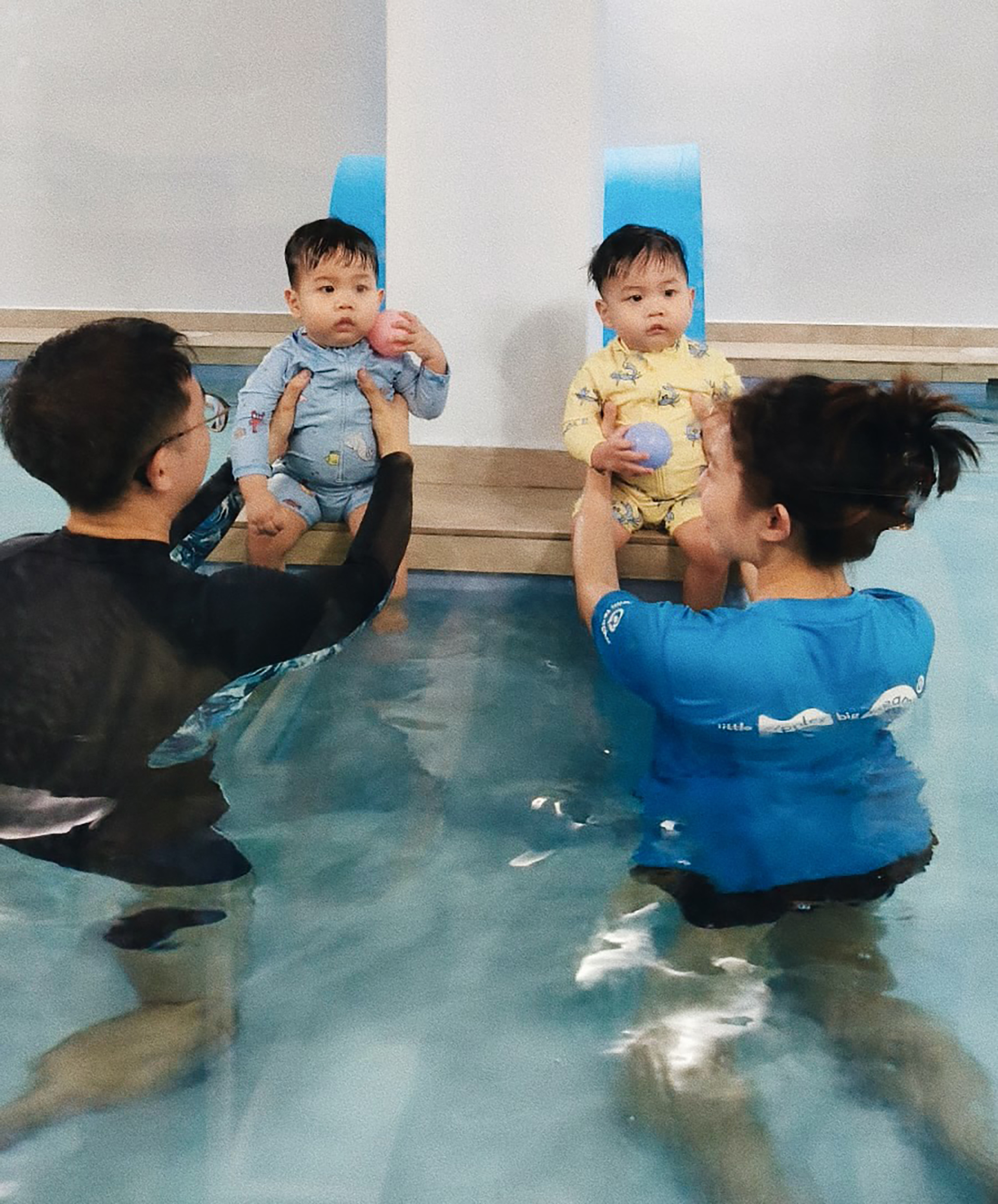
Take it one moment at a time. Perfection isn't the goal; connection is. Give yourself grace, trust that you'll find your rhythm (even if it takes longer than expected), and remember that every family's journey looks different. You're already doing better than you think you are.
Beyond the initial shock and the learning curves, Sarah and Harold’s experience with their MCDA twin boys reveals the core of modern parenting: adaptability. Their choices—from KKH's subsidised route to embracing formula feeding and hiring a helper—were all made in the name of sustainability.
For future parents of multiples, their story is a vital reminder that navigating the postpartum period with twins or triplets isn't about doing everything yourself, but about building a team and making the choices that allow you to be present, resilient, and truly enjoy the chaos.
We thank Sarah and Harold for their generous sharing, and hope that this article will be of benefit and encouragement to the parenting community. For more updates on their life with the twin toddlers, follow them on Instagram or Medium!
__
Whether you're raising multiples or multiple children, finding a supportive parenting community makes all the difference. Join the conversation and share your experience with us!

